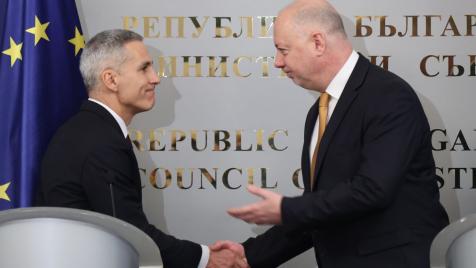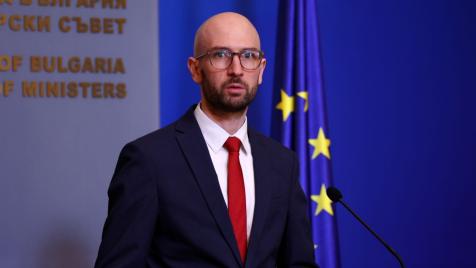The Bulgarian Ministry of Finance inflated budget revenues for 2025 by an incredible 10 billion euros
Lyudmila Petkova's budget looks "artificially stretched" to keep its deficit within 3%
© ECONOMIC.BG / Krasimir Svrakov
The Bulgarian Ministry of Finance is betting on an unprecedented annual growth in revenues and expenditures in Budget 2025. The state department expects 10 billion euros more in revenues next year and the same increase in expenditure. In other words, these impressive numbers, which seem unrealistic given the history of Bulgarian public finances, will not help reduce the state budget deficit below 3%, but will simply keep it within this limit.
The budget draft, published on Monday, shows that next year's budget expenditure will jump to 50 billion euro, and revenues to 46 billion euros. And this will happen in a year when only 2.4% average annual inflation and 2.8% economic growth are expected.
Even in 2022, when the highest inflation in Bulgaria in 25 years was recorded, revenues grew by only 5 billion euros. And during the highest economic growth in recent years – 7.7% in 2021 – revenues jumped by about 4.2 billion euros.
For further comparison, in 2023, revenues increased by about 3 billion euros. For the current year, the plan is for revenue growth to reach 4.5 billion euros. However, less than a month before the end of the year, collection is lagging behind and instead of the planned 37.5 billion euros, in all likelihood, only about 36 billion euros will be collected - meaning the growth will actually shrink to 3 billion euros.
The budget framework seems to be stretched in such a way that, with the existing huge expenditures that have been steadily set over the past few years, its deficit gap can be kept within the 3% limit.
Where will the 10 billion euro come from?
The huge revenue growth has been planned without raising any of the main taxes, such as VAT, corporate tax, or personal income tax.
Thus, several other measures are expected to be put in motion to achieve the 10 billion euro increase in revenue.
A new tax on the extraction of underground minerals has been proposed. The expected revenue from this tax is about 450 million euros.
Another idea is the declaration of two types of tax amnesty – one for the repayment of declared but unpaid taxes and another for undeclared taxes due in previous years, which would, however, be subject to a one-time 15% taxation. The expectations are that these steps will bring in about 2.5 billion euros.
The return of the 20% VAT for restaurant meals and bread will provide about 225 million euros, and the increase in excise duty on tobacco products and alcohol - over 200 million euros.
Other measures to reduce the share of the shadow economy have also been mentioned. These should bring about 425 million euros in additional revenue next year; however, no details have been provided on that.
On the other hand, it seems that the Ministry of Finance, after talks with the BNB and commercial banks, has decided to avoid introducing an extraordinary tax on the financial institutions’ profits.
In the coming years
The three-year framework of the Ministry of Finance shows that this extraordinary revenue growth is only planned for 2025, whereas in 2026 only about 1.25 billion euros more will be collected, and for 2027, even a decrease in the revenue has been projected.
Translated by Tzvetozar Vincent Iolov

 Antoniya Simova
Antoniya Simova 




